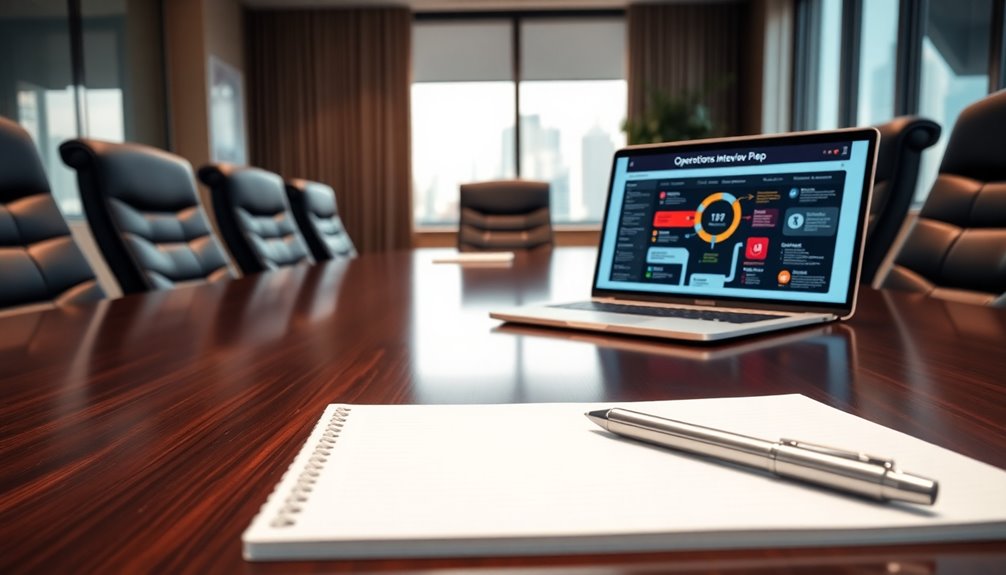Mastering cultural fit in interviews means aligning your personal values with the organization's mission. Start by researching the company culture to understand its core principles. Reflect on your work preferences and experiences that resonate with what you discover. Anticipate typical interview questions about your ideal work environment and leadership styles. When answering, use specific examples to showcase how you embody these values. Finally, prepare thoughtful questions about team dynamics and company culture to demonstrate your genuine interest. This approach will set you apart and help you connect with the organization on a deeper level, revealing even more insights ahead.
Key Takeaways
- Align your personal values with the organization's mission to demonstrate cultural compatibility during interviews.
- Research the company's culture through various platforms to understand their core principles and work environment.
- Prepare specific examples from your past experiences that reflect the values and behaviors the company prioritizes.
- Practice answering common cultural interview questions to articulate your preferences and motivations clearly and confidently.
- Prepare insightful questions about team dynamics and company culture to show genuine interest and engagement.
Defining Company Culture

Company culture is the heartbeat of an organization, shaping how employees interact and make decisions. It includes the attitudes, values, and behaviors that guide your daily work life. Understanding this culture helps you navigate the workplace effectively.
You'll find mission statements that articulate the organization's core principles and goals, while social interactions promote teamwork and collaboration. Evaluation methods can influence how performance is assessed, and celebrating successes boosts morale.
Recognizing the importance of company values is vital—you'll align your personal motivations with those values to enhance your fit within the organization. A strong culture fosters a sense of belonging, improving not just individual satisfaction but also overall productivity and employee retention. Embracing this culture is essential for your success. Additionally, cultivating a positive workplace environment can lead to improved employee retention, which is a key factor in maintaining a thriving organization.
Preparing for Cultural Interviews

When gearing up for a cultural interview, it's crucial to align your personal values with those of the organization. Start by researching the company culture through their website, social media, and employee reviews. Understand their mission statement and core values, as this knowledge will help you tailor your responses.
Reflect on your work preferences and how they fit within the company's environment. Think about examples from your experiences that showcase your alignment with their culture. Also, prepare insightful questions to ask the interviewer, demonstrating your genuine interest.
Additionally, consider how establishing healthy boundaries can foster a respectful and productive workplace, which is often a key aspect of company culture. Finally, practice articulating your thoughts clearly and confidently, ensuring you convey your compatibility without hesitation. This preparation will greatly enhance your chances of making a positive impression.
Typical Cultural Interview Questions

Cultural interview questions often dive deep into your personal work style and values, helping employers gauge your fit within their organization.
You might encounter questions about your ideal work environment, such as whether you thrive in collaborative settings or prefer independent tasks.
Expect inquiries about your ideal supervisor, as hiring managers want to understand your preferences for leadership styles.
Questions about feedback mechanisms will reveal how you handle constructive criticism.
You may also be asked what motivates you to apply for the position and how you envision your first 90 days at the company.
Additionally, discussing recent books or podcasts can highlight your interests and values, offering insight into your personality and cultural alignment with the organization.
Effective Answering Techniques

While preparing for cultural interview questions, it's essential to adopt effective answering techniques that showcase your compatibility with the organization. Start by aligning your responses with the company's core values. Use specific examples from your past experiences that reflect these values, demonstrating how you embody them in your work.
When discussing your work environment preferences or ideal supervisor characteristics, be honest and articulate how they match the company culture. Don't shy away from sharing your motivations for applying; this helps convey your enthusiasm.
Finally, prepare thoughtful questions for the interviewer about team dynamics and culture; this shows genuine interest and can lead to a more engaging conversation. Remember, authenticity resonates well and can greatly strengthen your candidacy.
Assessing Cultural Fit

Evaluating cultural fit is essential in determining whether a job opportunity aligns with your values and work style. To assess this fit effectively, consider the following aspects:
- Your personal values and how they relate to the company's mission.
- The work environment you thrive in—collaborative or independent.
- The leadership styles that motivate you and how they mesh with the organization.
- The importance of work-life balance to you and how the company supports it.
- Your adaptability to different team dynamics and stress management techniques.
Follow-Up Best Practices

A thoughtful follow-up after your interview can set you apart from other candidates. Within 24 hours, send a thank-you email to express your gratitude for the opportunity.
Mention specific points from the conversation to show you were engaged and genuinely interested. Reinforce your enthusiasm for the role and how your values align with the company's culture.
If you haven't heard back within a week, it's appropriate to send a polite follow-up email inquiring about the decision timeline. This indicates your continued interest without coming off as pushy.
Non-Verbal Communication Tips

Non-verbal communication plays an essential role in interviews, often conveying your confidence and engagement more than words alone.
To guarantee your non-verbal cues align with your message, focus on these tips:
- Maintain eye contact to show attentiveness and sincerity.
- Use open body language to convey approachability; avoid crossing your arms.
- Smile genuinely to create a positive atmosphere and build rapport.
- Nod occasionally to demonstrate understanding and encourage further dialogue.
- Be aware of your posture; sit up straight to project confidence and professionalism.
In addition, being aware of your non-verbal cues can help in establishing strong communication skills that enhance relationships.
Frequently Asked Questions
How Can I Identify a Company's Culture Before Applying?
To identify a company's culture before applying, start by exploring their website for the mission statement and values.
Check their social media for insights into their tone and employee interactions.
Look for reviews on platforms like Glassdoor to gauge employee satisfaction.
Networking with current or former employees can provide firsthand experiences.
Pay attention to any community involvement or company events that reflect their values, as these often reveal a lot about the organization's culture.
What Role Does Diversity Play in Company Culture?
Diversity plays an essential role in shaping company culture. It brings different perspectives, fostering innovation and creativity.
When you embrace diverse backgrounds, you create an inclusive environment where everyone feels valued and heard. This inclusivity enhances collaboration, leading to better problem-solving and decision-making.
Plus, a diverse workforce can better reflect and understand a varied customer base, ultimately driving business success.
It's about creating a rich tapestry that strengthens the company's overall culture.
How Do Remote Teams Maintain Company Culture?
Remote teams can maintain company culture by prioritizing regular communication and collaboration.
You should schedule consistent video calls and virtual team-building activities to foster relationships.
Utilize collaboration tools to share updates and celebrate achievements, creating a sense of belonging.
Encourage open feedback and maintain transparency about goals and challenges.
Can Company Culture Change Over Time?
Absolutely, company culture can shift like a chameleon in a rainbow!
As businesses grow, adapt, or face new challenges, their culture often evolves. You might see changes in values, communication styles, or employee engagement as leadership and team dynamics transform.
If you're part of such a shift, embracing these changes can enhance your adaptability and overall satisfaction at work.
Stay alert and engaged, and you'll thrive no matter how the culture morphs!
How Should I Handle Cultural Misalignment During an Interview?
When you notice cultural misalignment during an interview, it's crucial to approach it thoughtfully.
Acknowledge any concerns you have and ask clarifying questions to understand the company's values better. Share your own values candidly, and discuss how they differ or align.
This honesty helps both you and the interviewer assess compatibility. Ultimately, trust your instincts; if the culture doesn't fit, it's okay to reconsider accepting an offer.
Conclusion
As you step into the world of interviews, think of it as dancing in a grand ballroom. The right rhythm—your authentic self—will harmonize beautifully with the company's tune. By showcasing your alignment with their values and culture, you won't just secure a position; you'll find a place where your talents can blossom. So, waltz in with confidence, engage with grace, and remember that every interaction is a chance to shine your light.









